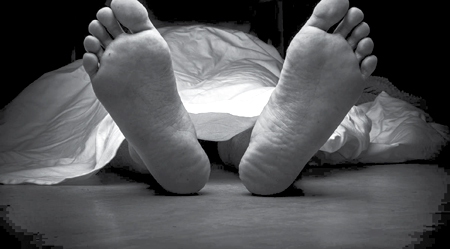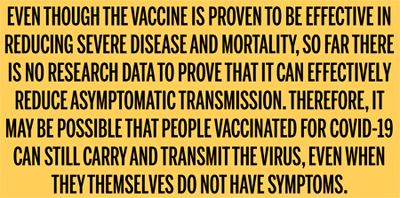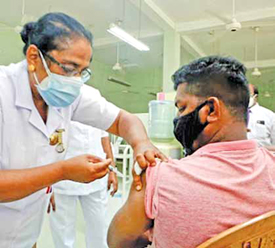
Amidst the global pandemic it was with much anticipation the introduction of the Covid-19 vaccination took place. While many affluent countries have initiated the vaccination programs, Sri Lanka launched the Covid-19 vaccination rollout on January 29, administering the Covishield vaccine donated by India under the Vaccine Friendship initiative. At the time of writing more than 700,000 people, including healthcare workers are been vaccinated across the country.
 Vaccinations were initiated at the Colombo National Hospital, Colombo North, Colombo South Teaching Hospitals, Mulleriyawa Base Hospital, Homagama Base Hospital and National Institute of Infectious Diseases giving priority for the frontline healthcare workers.
Vaccinations were initiated at the Colombo National Hospital, Colombo North, Colombo South Teaching Hospitals, Mulleriyawa Base Hospital, Homagama Base Hospital and National Institute of Infectious Diseases giving priority for the frontline healthcare workers.
However, much hesitant and doubts are still prevailing among the general public on the safety and effectiveness of the vaccine. The aim of this article is to debunk these common myths about Covid-19 vaccine.
What is a vaccine?
Vaccination is a simple, safe and scientifically effective way of protecting people against harmful diseases. It promotes the immune system (the natural defence mechanism) of the body to fight against the specific pathogens.
Types of vaccines for Covid-19
According to the World Health Organization (WHO), currently around 200 Covid-19 vaccine candidates are developing across the globe. Out of these, more than 60 are in clinical development. As of last month, at least seven Covid-19 vaccines have been rolled out in countries, giving priority for the most vulnerable people.
There are three main approaches in manufacturing a vaccine. Their differences lie in whether they use a whole virus, just the parts of the virus that triggers the immune system or just the genetic material that provides the instructions for making specific proteins. Similarly, vaccines against Covid-19 are also manufactured in these three approaches. The storage conditions requirement differs with the vaccine type.
Did the researchers rush to develop a vaccine and is the safety and efficacy of the vaccine reliable?
 This is a frequently heard question from the public. When assessing the process of developing the vaccine, it is clear that the researchers have never skipped any step in the usual development of vaccines. However the process was made faster as it was promptly funded and the genetic data of the virus were readily available with the scientists. Many companies and research institutes coordinated to manufacture vaccines against Covid-19, sharing a common goal.
This is a frequently heard question from the public. When assessing the process of developing the vaccine, it is clear that the researchers have never skipped any step in the usual development of vaccines. However the process was made faster as it was promptly funded and the genetic data of the virus were readily available with the scientists. Many companies and research institutes coordinated to manufacture vaccines against Covid-19, sharing a common goal.
Manufacturing of AstraZeneca vaccine
The AstraZeneca vaccine is a viral vector vaccine. In manufacturing this vaccine, the gene (Part of DNA of the coronavirus spike protein) has been combined with a harmless virus. The Oxford-AstraZeneca team used a modified version of a chimpanzee adenovirus as the viral vector to deliver genetic materials into cells.
In general, DNA is not as fragile as RNA, and the tough protein coat of the adenovirus effectively shields the genetic material inside. Hence, the Oxford-AstraZeneca vaccine for Covid-19 is more stable than the RNA vaccines. Therefore, it does not need to be stored in freezing temperatures and the vaccine is stable at refrigerator temperatures at 38–46°F (2–8°C).
AstraZeneca-Oxford and Covishield – India, are they the same?

On December 30, 2020, the UK authorised the emergency use of the AstraZeneca-Oxford vaccine for 18 years and older people. This vaccine was developed at the University of Oxford with the collaboration of AstraZeneca. People in the UK started receiving the vaccine from January 4, 2021. Since then, many countries have granted emergency use authorization of the AstraZeneca-Oxford vaccine.
On January 6 AstraZeneca-Oxford vaccine officially announced that Serum Institute of India has obtained emergency use authorization to reproduce and distribute the vaccine. Serum Institute of India is a leading vaccine manufacturer and has been one of the main vaccine suppliers for Sri Lanka’s successful national immunization program. The vaccine manufactured by the Serum Institute of India is named as “Covishield” and is a re-branding of the AstraZeneca vaccine manufactured in the UK.
The National Medicinal Regulatory Authority of Sri Lanka approved Emergency Use Authorisation of the vaccine giving the green-light for the national vaccine rollout.
What is an emergency use authorisation?
An Emergency Use Authorization (EUA) is a mechanism to facilitate the timely availability of medical products including vaccines while ensuring the stringent criteria on quality, safety and efficacy. This is especially adopted during public health emergencies such as the current Covid-19 pandemic. In this type of emergency situations authorities such as the FDA/ WHO uses the available evidences and carefully analyses the potential benefits over risks and issue an EUA, only if the benefits of the medicine clearly outweigh the risks.
On December 31, 2020, WHO issued their first EUA for a Covid-19 vaccine by authorizing the Pfizer/BioNTech vaccine, enabling the vaccine rollout.
On February 15, 2021, WHO listed the two versions of AstraZeneca vaccine, AstraZeneca-SKBio (manufactured in the Republic of Korea) and Covishield vaccine under the EUA confirmed list. This step initiated the global vaccine rollout through COVAX (Covid-19 vaccines Global Access) facility ensuring vaccine equity across the globe.
On March 7, Sri Lanka received the first batch of Covid-19 vaccines from the COVAX facility. This consignment contained 264,000 doses of vaccines which is the first instalment of the 1,440,000 doses, which will be arriving through May. According to the WHO, the additional doses to cover 20 percent of the Sri Lankan population will arrive during the second half of 2021.
Are there differences in the efficacy levels of the Covid-19 vaccine?
The efficacy levels of different vaccines have been determined by different settings with different criteria with different study populations. Therefore, it is not meaningful to compare efficacy levels between different vaccines. Further, there are many other factors such as safety, logistics, and feasibility when selecting a vaccine for a country.
According to the available data, combined average across different dosing regimens have found that the AstraZeneca vaccine was 70 percent effective in protecting against symptomatic disease. The most important finding is that, all commonly used Covid-19 vaccines show almost 100 percent effectiveness on preventing deaths and minimising severity of the disease.
Equitable worldwide distribution
It is important to remember that unless the majority of the those are immunised, we cannot assure effective controlling of the disease by the vaccination. This is described as herd immunity. When the majority (over 80 percent) of the population has become immune to the infection, the likelihood of infecting the those lacking the immunity is minimised.
Therefore, regardless of the financial status all countries should receive the vaccine equitably. Only if used the vaccine correctly and equitably, we could eradicate the acute phase of the pandemic and allow the rebuilding of our societies and economies.
Similarly, since resources remain scarce, immunisation programs will have to prioritise certain groups over others before the distribution is progressively expanded to all population groups.
To make this a reality, COVAX is bringing nations together, regardless of their income level, to ensure the procurement and equitable distribution of Covid-19 vaccines.
Side effects
Like all medicines, this vaccine also can cause side effects, although not everybody gets them. Almost all vaccines in use have reported similar side effects. These side effects are normal signs that the body is developing immunity. According to the available data, following are the possible side effects;
Very common (may affect more than 1 in 10 people)
Tenderness, pain, warmth, redness, itching, swelling or bruising where the injection is given.
Generally feeling unwell, feeling tired, (fatigue) chills or feeling feverish, headache, nausea, joint pain or muscle ache.
Common (may affect up to 1 in 10 people)
A lump at the injection site, fever,
Vomiting, flu-like symptoms, such as high temperature, sore throat, runny nose, cough and chills.
Uncommon (may affect up to 1 in 100 people)
Feeling dizzy, decreased appetite abdominal pain, enlarged lymph nodes, excessive sweating, itchy skin or rash (Sever allergic reaction can occur extremely rarely)
During the vaccine rollout in Sri Lanka, so far no serious adverse effects have been reported even though there were several reports of high fever, headache and myalgia (body pain).
Eligibility criteria for vaccination
The vaccine is not recommended if you have ever had a severe allergic reaction needing hospitalisation.
Age should be above 18 years. No data are currently available on the use of Covid-19 Vaccine in children and adolescents younger than 18 years of age. Since there are only limited data on the use of Covid-19 Vaccine AstraZeneca in pregnant or breastfeeding women, these categories are also excluded from vaccination.
If someone is having fever and is not feeling well on the date scheduled for vaccination, it will be postponed to another date.
If you are in the quarantined period or you were infected with Covid-19 during last 14 days your vaccination date will be postponed. It is to be noted that the history of Covid-19 infection is not a contraindication for the vaccine as it is not clear how long the natural immune response from the disease lasts.
If you are undergoing any of the following conditions, inform it to the doctor at the vaccination visit;
If you have ever had a severe allergic reaction (anaphylaxis) after any other vaccine injection.
If you currently have an infection with a high temperature (over 38°C).
If you have a bleeding disorder.
After completing the vaccination is it possible to go back to the normal lifestyle?
Even though vaccine is proven to be effective in reducing severe disease and mortality, so far there is no research data to prove that it can effectively reduce asymptomatic transmission. Therefore, it may be possible that people vaccinated for Covid-19 can still carry and transmit the virus, even when they themselves do not have symptoms.
Vaccination is an essential preventive strategy. But it is not a replacement for other preventive measures. Hence, adapting to the ‘New Normal’ is still essential. Wearing a mask, proper hand hygiene and maintaining social distancing are still needed until more is known and enough population has been vaccinated.
Getting vaccinated is part of your responsibility for the society and humanity. It is important to have faith on evidence-based science and trust on the vaccines recommended by the experts, receive it when it is made available, have realistic expectations, and finally, to adhere to the ‘New Normal’ until a significant percentage of the population is immune and safe.
The writer is the Medical Officer, Healthcare Quality and Safety, Ministry of Health.
